Les fiches récentes

Mise à jour : 28 décembre 2022 (Rédaction initiale : 10 juillet 2022 )
Publications

♾️suivre Marie-Anne Frison-Roche sur LinkedIn
♾️s'abonner à la Newsletter MAFR Regulation, Compliance, Law
____
 ► Référence générale : Frison-Roche, M.-A. Régulation et Compliance, expression des missions d'un Ordre, document de travail, juillet 2022.
► Référence générale : Frison-Roche, M.-A. Régulation et Compliance, expression des missions d'un Ordre, document de travail, juillet 2022.
____
🎤 Ce document de travail a été élaboré pour servir de base à une intervention dans le Congrès annuel de l'Ordre des Géomètres-Expert le 15 septembre 2022
____
🎥Regarder la courte présentation de cette intervention
____
🎥Regarder l'intégralité de cette conférence prononcée le 15 septembre 2022 sur la base de ce document de travail
____
► Résumé du document de travail : Les ordres professionnels ne doivent pas se penser comme des exceptions, si légitimes soient-elles, par rapport à un principe, qui serait le jeu concurrentiel, mais comme l'expression d'un principe. Ce principe est exprimé par deux branches du Droit dont l'importance ne cesse de croître dans le Droit européen, branches libérales qui se fondent sur une conception de la vie économique et de l'entreprise tournée avant tout vers le futur : le Droit de la Régulation et le Droit de la Compliance, deux branches du Droit à la fois liées et distinctes.
En effet et c'est l'objet de la première partie, il est vrai que le Droit de la Concurrence conçoit les ordres professionnels comme des exceptions puisque ces "corporations" constituent des ententes structurelles. Le Droit interne français à la fois consolide les ordres en les adossant à l'Etat qui leur subdéléguerait ses pouvoirs mais les embarque dans la remise en cause par l'Union européenne des Etats et leurs outils. Le plus souvent la tentation est alors de rappeler avec une sorte de nostalgie les temps où les ordres étaient le principe mais, sauf à demander comme une restauration, le temps ne serait plus.
Une approche plus dynamique est possible, en accord avec l'évolution plus générale du Droit économique. En effet l'Ordre professionnel est l'expression d'une profession, notion relativement peu exploitée, sur laquelle il exerce la fonction de "Régulateur de second niveau", les Autorités publiques exerçant la fonction de "Régulateur de premier niveau". Le Droit de la Régulation bancaire et financière est construit ainsi et fonctionne de cette façon, au niveau national, européen et mondial. C'est de cela qu'il convient de se réclamer.
Les Ordres professionnels ont alors pour fonction primordiale de diffuser une "culture de Compliance" dans les professionnels qu'ils supervisent et au-delà de ceux-ci (clients et parties prenantes). Cette culture de Compliance s'élabore au regard des mission qui sont concrétisés par les professionnels eux-mêmes.
C'est pourquoi la seconde partie du document de travail porte sur l'évolution juridique de la notion de "mission" qui est devenue centrale en Droit, notamment à travers la technique de l'entreprise à mission. Or les points de contact sont multiples entre la raison d'être, l'entreprise à mission et le Droit de la Compliance, dès l'instant que l'on définit celui-ci par les buts concrets et très ambitieux que celui-ci poursuit : les Buts Monumentaux.
Chaque structure, par exemple l'Ordre des Géomètres-Experts, est légitime à fixer le But Monumental qu'il poursuit et qu'il inculque, notamment le territoire et le cadre de vie, rejoignant ce qui unit tous les Buts Monumentaux de la Compliance : le souci d'autrui. L'Ordre des Géomètres-Experts est adéquat parce qu'il est dans un rapport plus flexible, à la fois plus resserré et plus ample, avec le territoire que l'Etat lui-même.
En inculquant cela aux professionnels, l'Ordre professionnel développe chez le praticien une "responsabilité ex ante", qui est un pilier du Droit de la Compliance, constituant à la fois une charge et un pouvoir que le professionnel exerce et dont l'Ordre professionnel doit être le superviseur.
____
🔓lire le document de travail ci-dessous⤵️
8 décembre 2022
Conférences
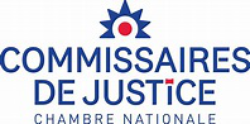
♾️ suivre Marie-Anne Frison-Roche sur LinkedIn
♾️s'abonner à la Newsletter MAFR Regulation, Compliance, Law
____
► Référence complète : M.-A. Frison-Roche, "La compliance, perspective dynamique pour exprimer la raison d'être des commissaires de justice", in Table-ronde sur "Professions réglementées, ambitions et enjeux", Congrès annuel national des Commissaires de justice, Paris, 8 décembre 2022.
____
►lire le programme complet du congrès et 🎥regarder la présentation du colloque par le président du Congrès
____
____
►présentation de l'intervention : Ce premier congrès annuel national des Commissaires de justice, réunissant pour la première fois la profession réformée, a débuté par un débat de 2 heures animé par une journaliste, débat entre les autres professions, les autorités publiques (Autorité de la concurrence, Chancellerie), ayant pour ma part à y apporter le regard académique :
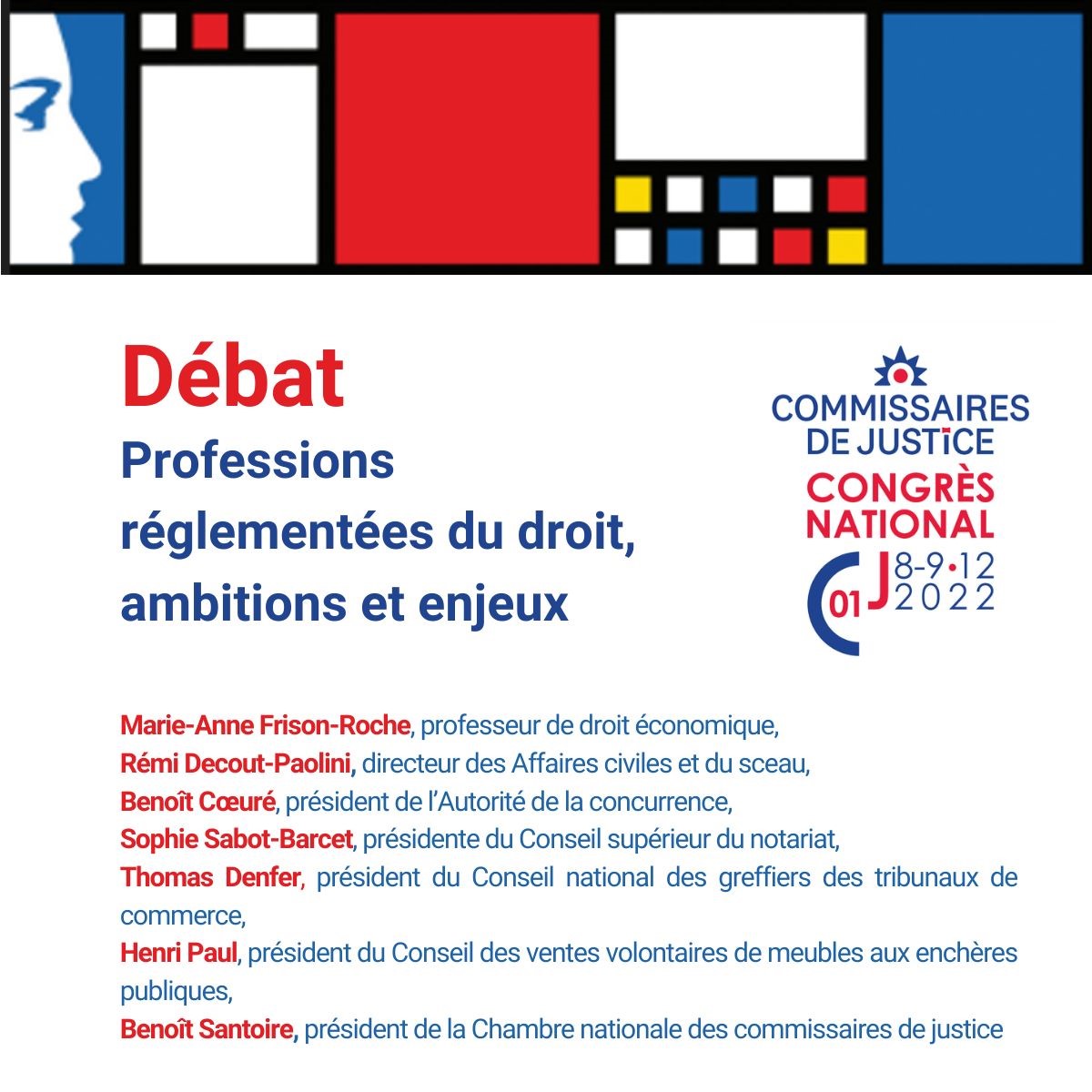
Ce débat fut particulièrement animé et vivant, ne serait-ce qu'en raison de la configuration des lieux, chacun étant placé pour entrer dans un dialogue :

🎤 J'y pris la parole en premier pour insister sur le fait que les "professions" sont des structures qui ont un grand avenir, en ce qu'elles s'articulent avec le système économique libéral, qu'elles sont par nature régulées et porteuses de régulation, dans des systèmes qui, pour demeurer libéraux, vont en avoir de plus en plus besoin. Cela est pertinent pour la profession des Commissaires de justice qui procurent de la sécurité, via de l'incontestabilité reposant aussi sur le lien entre celle-ci et les faits, et qui assurent l'effectivité des engagements en gardant le souci du lien social.
🎤 J'ai repris la parole lorsque la place de la Compliance fut évoquée. Dépassant l'exigence de "conformité", qui n'est qu'un outil de la Compliance, j'ai montré l'avenir du Droit de la Compliance, notamment dans l'Europe qui associe dynamisme économique, souci des personnes et de l'environnement, et l'alliance que cela implique entre les Autorités politiques et publiques et les entités susceptibles de participer à la concrétisation de ces Buts Monumentaux de la Compliance.
📕 Pour aller plus loin : M.-A. Frison-Roche (dir.), Les buts monumentaux de la compliance, 2022.
________

regarder la présentation du colloque par le président du Congrès

5 décembre 2022
Enseignements : Participation à des jurys de thèses

♾️ suivre Marie-Anne Frison-Roche sur LinkedIn
♾️s'abonner à la Newsletter MAFR Regulation, Compliance, Law
____
► Référence complète : M.-A. Frison-Roche, membre du jury de la thèse d'Antoine Oumedjkane, Compliance et droit administratif, Université de Montpellier, Salle des Actes, Université de Montpellier, 5 décembre 2022, 14h-
____
🪑🪑🪑Autres membres du jury :
🕴🏻Pascale Idoux, directrice de la thèse
🕴🏻Lucie Cluzel-Métayer, rapporteure
🕴🏻Aude Rouyère, rapporteure
🕴🏻Thomas Perroud, professeur à l'Université Panthéon-Assas (Paris II)
____
► La thèse a été ultérieurement publié : cliquer ICI
____
1 décembre 2022
Publications
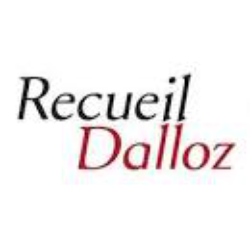
🌐suivre Marie-Anne Frison-Roche sur LinkedIn
🌐s'abonner à la Newsletter MAFR Regulation, Compliance, Law
____
► Référence générale : M.-A. Frison-Roche, "Contrat de compliance, clauses de compliance", Chronique de Droit de la Compliance, D.2022, p.2115-2117.
____
____
►Lire la présentation des chroniques suivantes :
- "Droit de la compliance et contentieux systémique", 2025
- "Compliance et conformité : les distinguer pour mieux les articuler", 2024
- "La loi, la compliance, le contrat et le juge: places et alliances", 2023
►Lire la présentation des chroniques précédentes :
- "L'aventure de la Compliance", 2020
- "Compliance et personnalité", 2019
____
____
► Présentation de l'article : L’on ne voit souvent dans le droit de la compliance que l’obligation de se conformer à la réglementation. Le droit des obligations en est comme masqué par l’étude des textes et des sanctions. Les cas de responsabilité civile commencent à faire ressortir les engagements des entreprises, actes de volonté. Reste à discerner l’importance des contrats.
En premier lieu, existe un contrat spécifique : le « contrat de compliance ». Il a pour objet la fourniture par un tiers d’une prestation, les moyens pour l’entreprise de « se conformer » à la loi, ou/et de permettre à celle-ci d’atteindre les buts monumentaux qui caractérise le droit de la compliance. L’interprétation et le régime du contrat de compliance doit être marqué par le Droit de la compliance qui l’imprègne. En second lieu, des multitudes de clauses visent la conformité et la compliance.
____
🚧lire le document de travail ayant servi de base à l'article
____
📚Lire les autres articles publiés dans la chronique de Droit de la Compliance publiées au Recueil Dalloz.
________
29 novembre 2022
Conférences

♾️ suivre Marie-Anne Frison-Roche sur LinkedIn
♾️s'abonner à la Newsletter MAFR Regulation, Compliance, Law
____
Référence générale : M.-A. Frison-Roche, "La compliance au coeur de la santé durable", in Pour une géopolitique de la santé durable, Université de Laval, 29 novembre 2022.
___
consulter le programme général du colloque
18 novembre 2022
Conférences
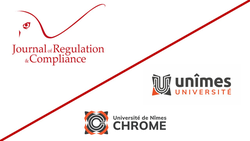
♾️ suivre Marie-Anne Frison-Roche sur LinkedIn

♾️s'abonner à la Newsletter MAFR Regulation, Compliance, Law
____
► Référence complète : M.-A. Frison-Roche, "Synthèse", in Journal of Regulation & Compliance (JoRC) et Université de Nîmes Compliance et Contrat : les acteurs et leurs stratégies, Nîmes, 18 novembre 2022.
____
🧮 lire le programme complet du colloque
____
🏗️Ce colloque prend place dans le cycle de colloques, organisé par le Journal of Regulation & Compliance (JoRC) et les Universités qui sont ses partenaires académiques, pendant l'année 2022/2023 autour du thème général L'obligation de compliance.
____
✏️ cette synthèse prend appui sur un document de travail élaboré en temps réel au fur et à mesure que se déroulait la journée du colloque.
🚧 lire ce document de travail : "Ce qui est commun à la Compliance, au Contrat et aux Personnes impliquées par le Contrat"
____
► Résumé de la synthèse réalisée en temps réel :
18 novembre 2022
Conférences

♾️ suivre Marie-Anne Frison-Roche sur LinkedIn
♾️s'abonner à la Newsletter MAFR Regulation, Compliance, Law
____
► Référence complète : M.-A. Frison-Roche, "Le juge, tiers régulateur des obligations contractuelles de compliance", in Journal of Regulation & Compliance (JoRC) et Université de Nîmes, Laboratoire CHROME, Compliance et Contrat : les acteurs et leurs stratégies, Nîmes, 18 novembre 2022.
____
🏗️Cette conférence prend place dans le cycle de colloques, organisé par le Journal of Regulation & Compliance (JoRC) et les Universités qui sont ses partenaires académiques, pendant l'année 2022/2023 autour du thème général L'obligation de compliance.
____
🎤 consulter la synthèse également faite de ce colloque
____
🧮Consulter le programme complet de cette manifestation
____
🚧lire le document de travail servant de base à cette conférence
____
📝Cette conférence sera la base d'un article, à paraître dans un ouvrage qui en résultera, dans sa version française, dans la collection 📚Régulation & Compliance coéditée entre le JoRC et les Editions Dalloz, et dans sa version anglaise, dans la collection 📚Compliance & Regulation coéditée entre le JoRC et les Editions Bruylant.
____
17 novembre 2022
Conférences
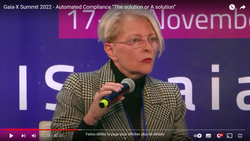
♾️ suivre Marie-Anne Frison-Roche sur LinkedIn
♾️s'abonner à la Newsletter MAFR Regulation, Compliance, Law
____
► Référence complétée : M.-A. Frison-Roche, "The distinction between the part and the whole", contribution of the Chapter 2 of the third global Summit of Gaia-X, Chapter on Automated compliance: "the" solution or "a" solution?, 17 novembre 2022, Paris.
____
Cette intervention prend place dans un panel dirigé par 🕴️Hubert Tardieu, membre du Conseil de direction de Gaia-X, et composée également de :
🕴️Martine Gouriet, Board of Direction Gaia-X and Directrice des Usages numériques EDF – DSIG
🕴️Jakob Rehof, Chair, Software Engineering, Technical University Dortmund Faculty of Computer Science and Director Research Strategy, Fraunhofer-ISST
🕴️Joëlle Toledano, Conseil National du Numérique (CNNum), Chaire Gouvernance & Régulation (Université Dauphine) – Professeur émérite
____
🧮Consulter le programme complet de la manifestation
____
🚧lire le document de travail sur lequel cette participation à la table-ronde est basée.
____
____
📝lire la présentation de l'intervention faite dans le GaiaX Global Summit de 2020
________